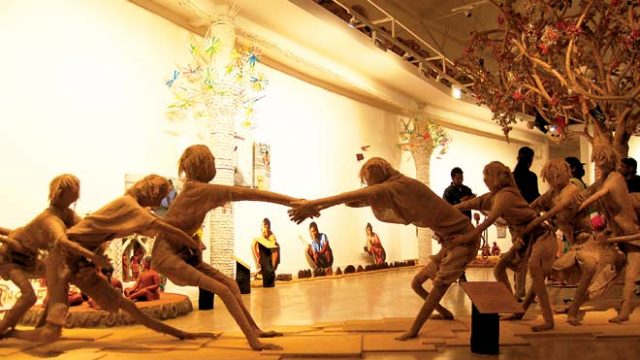Bhopal has quietly emerged as the museum capital of India. The city is a hub of cultural connections that stretch back millenniums and its diversity is reflected in its museums. Apart from the Bharat Bhavan folk art complex and the anthropologically-minded Museum of Man (Rashtriya Manav Sangrahalaya), it has a beautifully refurbished State Archaeological Museum and an engaging Science Museum.
But the most exciting in this set of distinguished institutions is the youngest: the Madhya Pradesh Tribal Museum, which opened in June 2013. Built over seven acres of land next to the Archaeological Museum, it is housed in a striking building designed by Revathi Kamath.
The museum stands out from all others in the country because of the way its exhibits are put up. It does not conform to the old, sedate style of showing individual artworks as distinct masterpieces, with little contextual information. Instead, it celebrates the ways of life practised by the seven major tribes in the state – the Gond, Bheel, Korku, Baiga, Sahariya, Kol and Bhariya – through their crafts. In a series of riotously colourful galleries whose roofs soar as high as three-storey buildings, the dramatically-lit artefacts project tribal living, aesthetics, and spiritual beliefs. Another couple of galleries showcase the state’s cultural diversity and the works of the tribals of Chhattisgarh. The artworks can hang from trees, can leap at you from walls, or, in one gallery, can be seen from a two-storeyed wooden porch in the middle. The kudos for the exhibit design goes to Chandan Singh Bhatti, an artist who heads Bharat Bhavan’s graphics department.
Ashok Mishra, editor of the Chaumasa magazine on tribal art and life, informs that there are plans to build an auditorium and the children’s gallery is to be made into a larger exhibition space. The lack of an auditorium, though, hasn’t deterred the museum from hosting a series of cultural programmes in its library. As a result, the number of visitors per day has ranged from about 100 (“on a day it rained heavily”) to more than 1,500. So come rain or shine, a visit to this outstanding museum will pay you well.




